Namma Chennai diary: Anitha tragedy will echo beyond efficacy of tests

The death of Shanmugam Anitha is a great human tragedy. The reasons behind it make her suicide a microcosm of far bigger issues than the disappointment of one student in not getting a medical seat in Tamil Nadu. However bright the poor girl from Ariyalur was in cracking her board exams, she could not beat NEET. Therein lies a tale of State Board versus CBSE and more. It is an issue that impinges on State-Centre relations and shared rights too.
Jayalalithaa used to emphasise this point about rural students being incapacitated by the system which tends to favour the urban against the rural, the creamy layer of OBC against the lesser mortals, the private tuition-armed exam crackers against those with sufficient intelligence to shine in the rote system encouraged by a stream of school education that has not adapted quickly enough to the competitive world. A tragedy like Anitha was waiting to happen in the time of NEET.
The NEET issues had been allowed to fester for too long. Caught between Jaya’s desire to keep Tamil Nadu medical seats for its students in the hope that they would in the course of medical education improve to cope with the demands of becoming a doctor and a more evolved system in which the brightest students get into the most elite professions, NEET became Tamil Nadu’s nightmare. The political posturing on it didn’t help either as the State’s leaders tried to parlay their relationship with the ruling BJP to extracting concessions for another academic year.
A life has been snuffed out by the emotional immaturity of youth. In the anger of the moment, the agitators will blame everyone, from the politician to the Supreme Court judges. But if you see it logically, the State of Tamil Nadu has to take the blame for not improving its education system in time to enable it students to take to objective assessment as in national entrance tests. A student who scored 1,176 out of 1,200 in the Boards got only 86 of 700 in NEET. The disparity in performance is too huge to be explained away in rich versus poor. It indicates a systemic failure.
All of us feel the grief at the loss of a tender life and not only Kamal Haasan and Rajinikanth. The challenge lies in doing something about it. How does a country with a population of 125 crore people (and rising) wish to make do with some 50,000 doctors a year? Why not allow the opening of more medical colleges that can turn out competent medical professionals and, maybe, set a certain proportion of seats for NEET and for the students of the State in which these new medical colleges are located? Can’t the MCI see the logic of a need to expand the base and within that find a greater balance for regional aspirations?
The flip side is NEET was a reality Tamil Nadu refused to countenance. Pleading for reserving seats was such a priority that the updating of the state board syllabus was kept on the backburner for too long. TN refused to compete while rural students from other states, who are also similarly disadvantaged in terms of tuition, took it up as a challenge. For decades now, State board students from Tamil Nadu have been struggling to cope with the demands in any stream of collegiate study. This was their plight whether they got seats on merit or by reservation.
Do note that the NEET system does allow for reservation for State students within the merit-based assessment. For instance, since 85 per cent of seats in TN’s medical colleges are reserved for students from the State, it just means that TN students are beating their peers to seats here. They are invariably the brighter ones who have prepared more to meet the standards of the common national entrance test based on a wider knowledge base than textbook oriented state board students.
The State has prided itself for long about its healthcare standards and its diagnostic and treatment facilities, which are clearly one of the best in the country leading to a large amount of medical tourism, both domestic and international. That should not suffer from any fall in standards of medical education. The arguments can go on about how important social inclusiveness is, but the fact remains that the real world is about competition.
As a State which does well in medical professionalism, Tamil Nadu has a reason to worry about what is going on in the resistance to NEET and a dislike of the coaching system aimed at cracking entrance tests. Meanwhile, we say a prayer for the soul of young Anitha to rest in peace. We may not agree with anyone ending his / her life for any reason, but we can see the effect of human failure in poor Anitha’s final decision.

